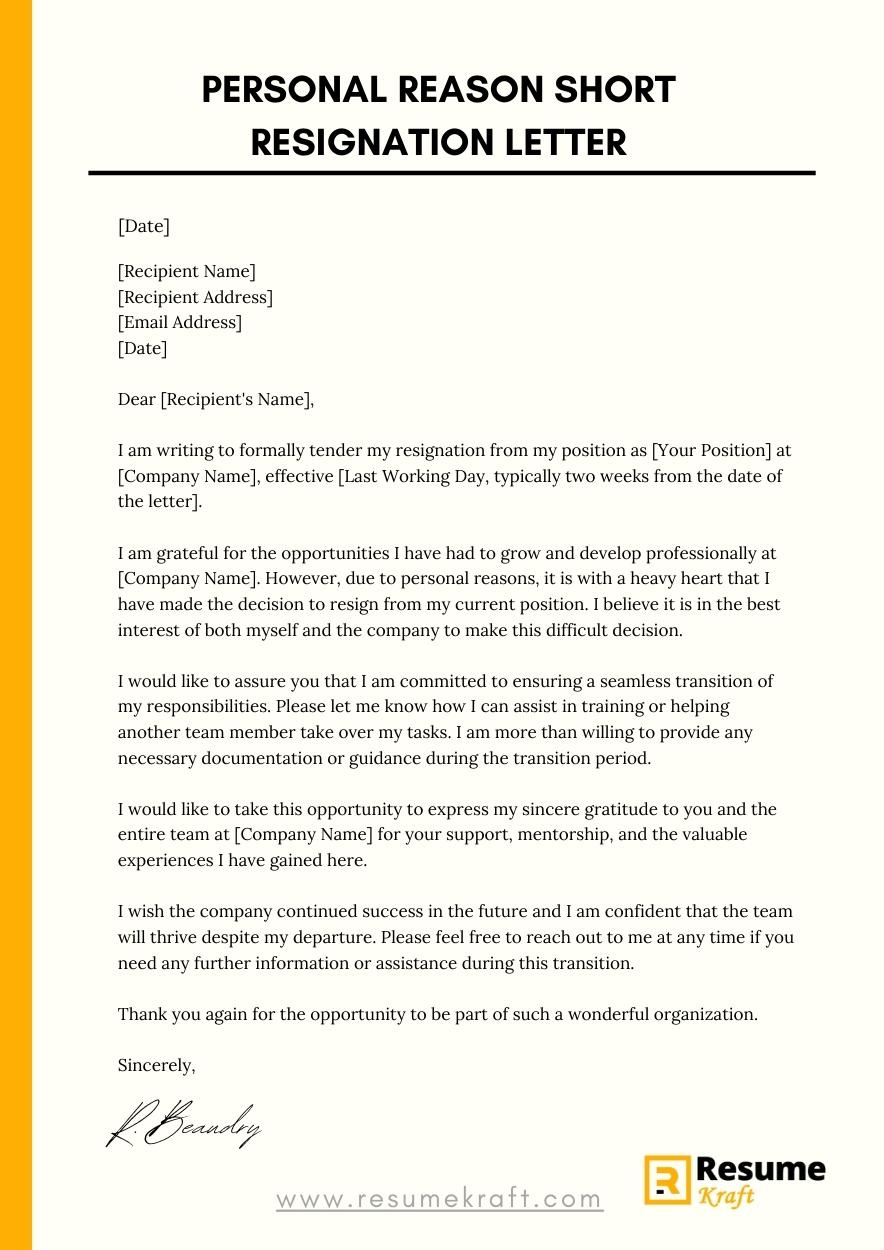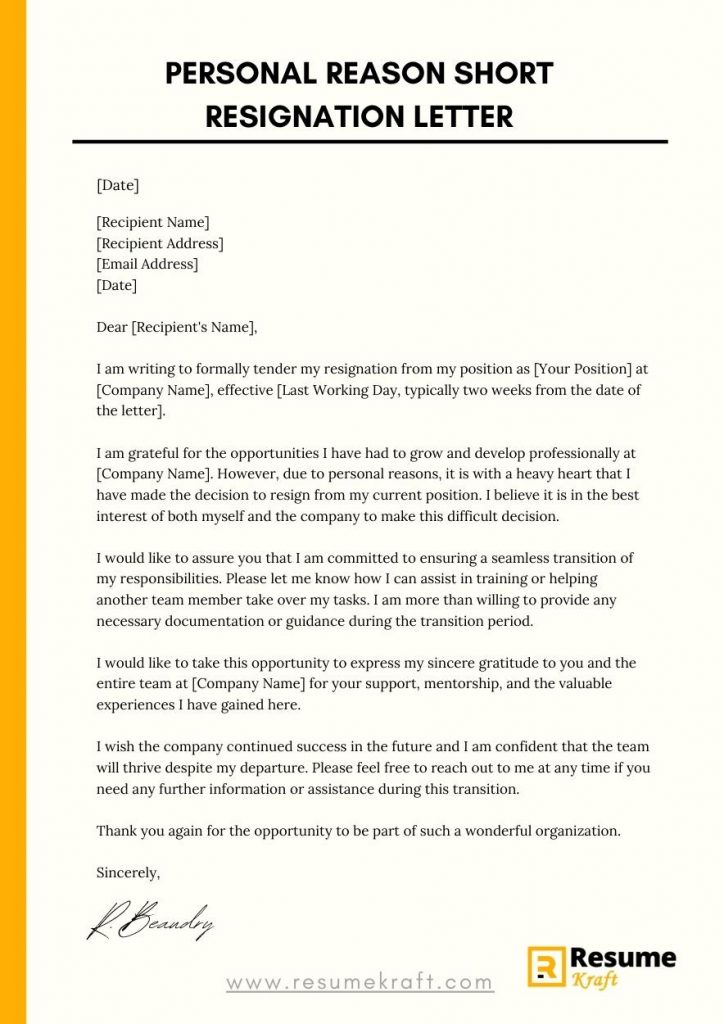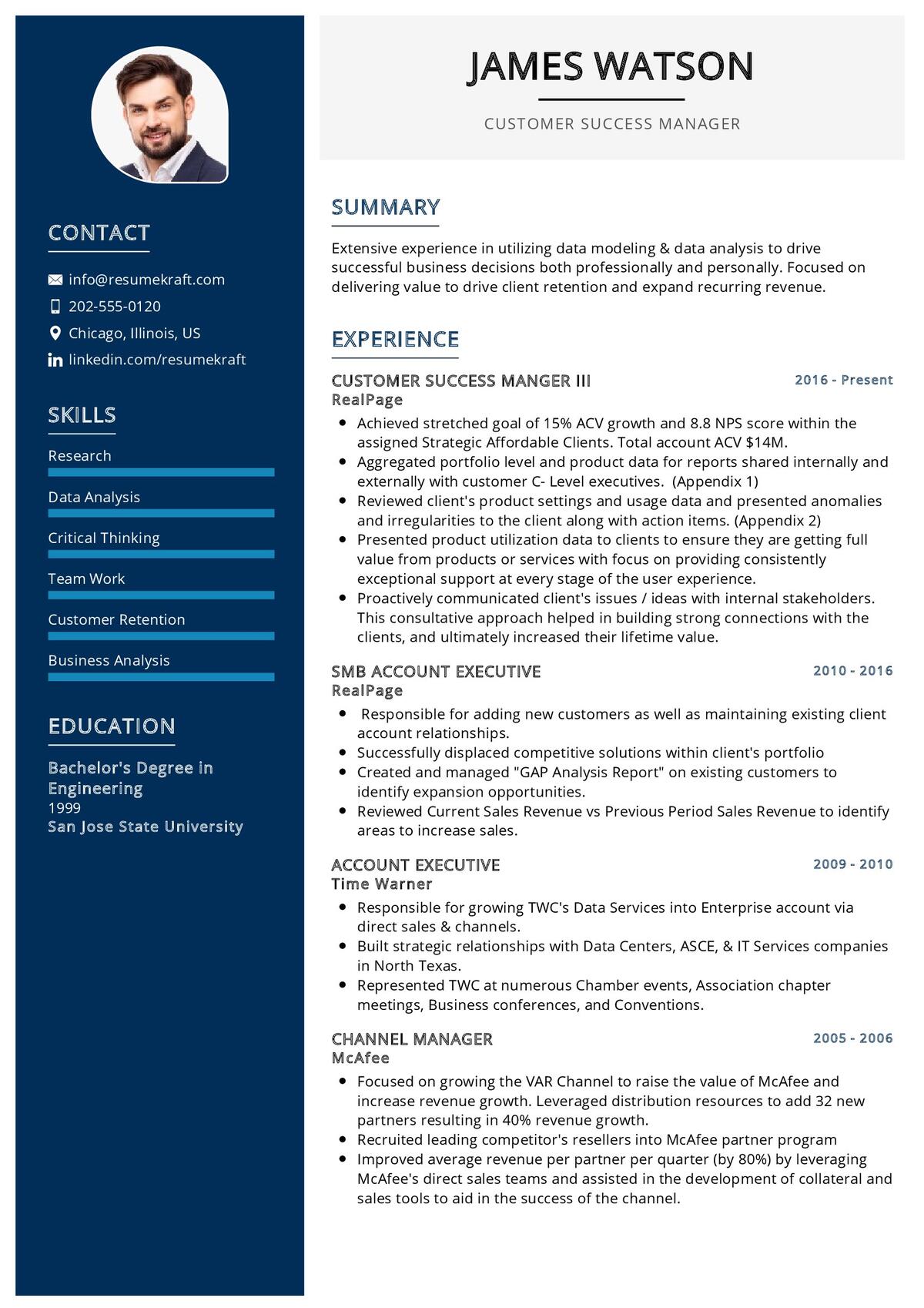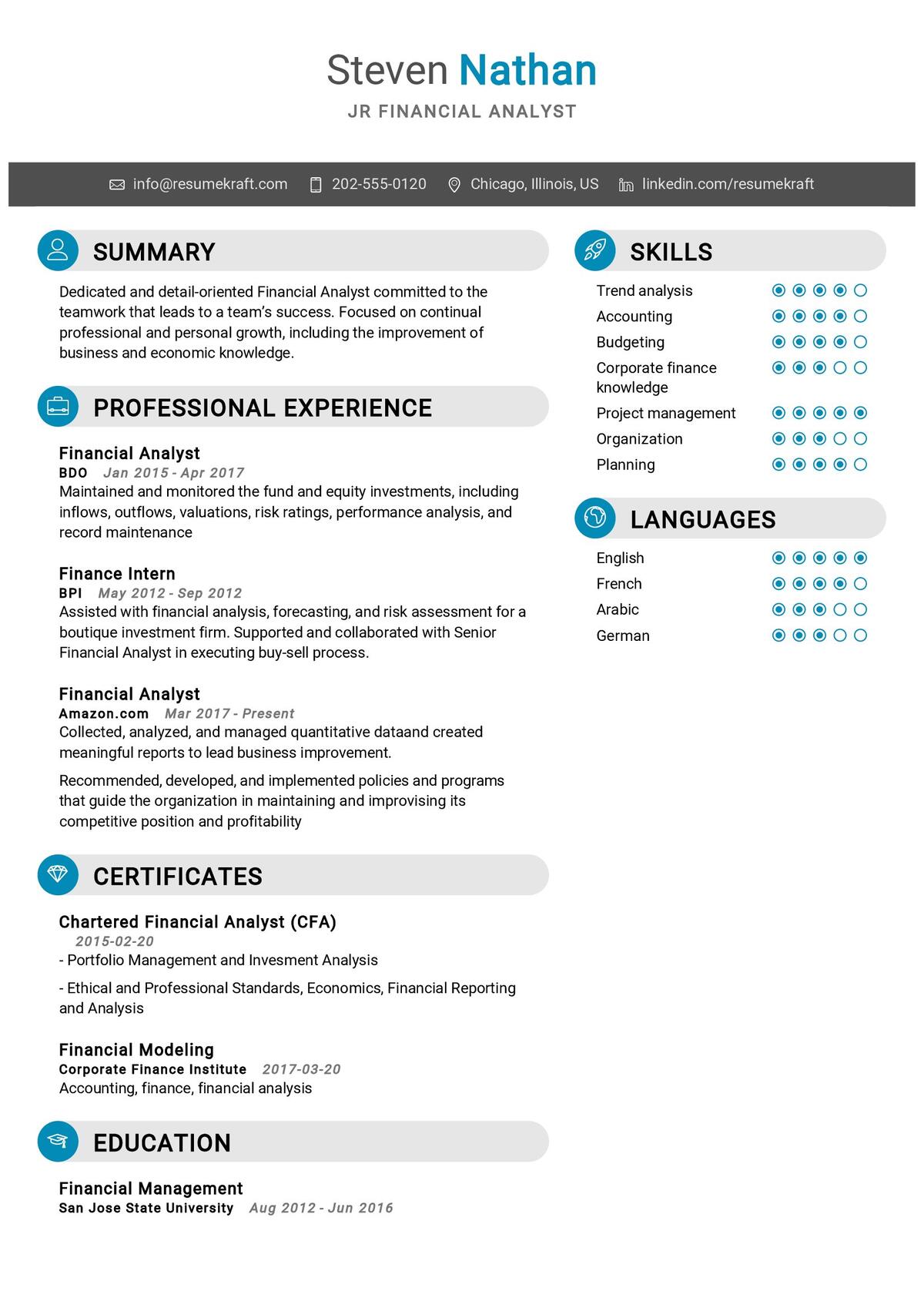
Resigning from a job can be a daunting task, but it is important to do it professionally and cordially. Whether you need to leave your job due to personal reasons, you can make the process smoother by writing a concise resignation letter. In this article, we will guide you on how to write a personal reason short resignation letter that effectively communicates your decision while maintaining your professional relationships. We will also provide you with some resignation letter samples to help you get started.
When drafting your resignation letter, it is essential to include specific information while keeping it concise and professional. Here’s what you should include in your personal reason short resignation letter:
What To Include in a Personal Reason Short Resignation Letter
- Date: Begin your resignation letter by including the date of when you are submitting it. This allows both parties to have a clear understanding of the timeline.
- Recipient Information: Include the name and designation of the person or department to whom you are addressing the resignation letter. This ensures that your letter reaches the appropriate person.
- Salutation: Start your letter with a proper salutation, such as “Dear [Recipient’s Name].” This sets a professional tone and shows respect.
- Statement of Resignation: Clearly and concisely state your intention to resign from your current position. Be direct and mention that you are resigning from your role.
- Effective Date: Specify the date on which your resignation should take effect. This allows your employer to make the necessary arrangements for your departure.
- Gratitude: Express your gratitude for the opportunities and experiences you had during your employment. Show appreciation for the knowledge and skills you acquired with the company.
- Reason (Optional): While it is not mandatory to provide a reason for your resignation, you may choose to mention a general reason for your departure, such as personal circumstances. However, be mindful of sharing too many personal details and keep your explanations brief and professional.
- Assistance Transitioning: Offer your assistance in transitioning your responsibilities to another employee. Show your willingness to help make the process easier for your team and employer.
- Closing: End your resignation letter on a positive note by expressing optimism for the future and wishing the company continued success. Use a professional sign-off such as “Sincerely” or “Best regards.”
What Not to Include in Your Personal Reason Short Resignation Letter
Despite the brevity of a short resignation letter, there are a few things you should avoid including:
- Negative Feedback: Refrain from including negative feedback or criticisms about the company, colleagues, or management. Keep your resignation letter positive and professional.
- Rambling Explanations: Keep your reason for resignation brief and to the point. Avoid going into unnecessary details or explanations that may not be relevant to your departure.
- Emotional Language: While it is natural to have emotions when resigning, it is important to keep your resignation letter objective and professional. Avoid using emotional or inflammatory language.
- Apologies or Guilt: Do not apologize for resigning or express guilt about your decision. Resigning is a personal and professional choice, and there is no need to feel guilty about pursuing your own path.
How to Format a Personal Reason Short Resignation Letter
The format of your resignation letter should be professional, concise, and easy to read. Here’s a suggested format:
- Your Information: Start by including your name, address, phone number, and email address at the top of the letter. This makes it easy for your employer to contact you if needed.
- Recipient Information: Next, include the name, designation, and address of the person or department to whom the letter is addressed.
- Salutation: Open the letter with a proper salutation, such as “Dear [Recipient’s Name].”
- Body: Write a brief and direct statement regarding your resignation. Include your intended last day of work and express gratitude for the opportunities you had.
- Transition Assistance: Offer your assistance in transitioning your responsibilities to another employee, if applicable.
- Closing: End the letter on a positive note by expressing your best wishes for the company’s future success.
- Sign-off: Sign your letter using a professional sign-off, followed by your typed full name and position.
Personal Reason Short Resignation Letter Sample

Printed Resignation Letter Sample
[Your Name]
[Your Address]
[City, State, ZIP]
[Phone Number]
[Email Address]
[Date]
[Recipient’s Name]
[Recipient’s Designation]
[Company Name]
[Company Address]
[City, State, ZIP]
Dear [Recipient’s Name],
I am writing to formally tender my resignation from my position as [Your Position] at [Company Name], effective [Last Working Day, typically two weeks from the date of the letter].
I am grateful for the opportunities I have had to grow and develop professionally at [Company Name]. However, due to personal reasons, it is with a heavy heart that I have made the decision to resign from my current position. I believe it is in the best interest of both myself and the company to make this difficult decision.
I would like to assure you that I am committed to ensuring a seamless transition of my responsibilities. Please let me know how I can assist in training or helping another team member take over my tasks. I am more than willing to provide any necessary documentation or guidance during the transition period.
I would like to take this opportunity to express my sincere gratitude to you and the entire team at [Company Name] for your support, mentorship, and the valuable experiences I have gained here.
I wish the company continued success in the future and I am confident that the team will thrive despite my departure. Please feel free to reach out to me at any time if you need any further information or assistance during this transition.
Thank you again for the opportunity to be part of such a wonderful organization.
Sincerely,
[Your Typed Name]
[Your Position]
Email Resignation Letter Example
Subject: Resignation – [Your Name]
Dear [Recipient’s Name],
I hope this email finds you well. I am writing to inform you of my resignation from my role as [Your Position] at [Company Name], effective [Last Working Day, typically two weeks from the date of the email].
Due to personal reasons, I have had to make the difficult decision to resign. I want to express my gratitude for all the opportunities and support that I have received during my time at [Company Name]. It has been a pleasure working with such a dedicated and talented team.
Please be assured that I will do my best to ensure a smooth transition of my responsibilities. I am available to discuss the handover process and provide any necessary documentation or training during this time.
I would like to thank you and the entire team once again for the valuable experiences and knowledge I have gained at [Company Name]. I wish you all continued success in the future.
Thank you for your understanding and support. If you have any questions or require any further information, please do not hesitate to reach out to me.
Best regards,
[Your Full Name]
[Your Position]
Planning to Write a Resume?
Check our job winning resume samples


Key Takeaways
Writing a personal reason short resignation letter requires clear and concise communication, professionalism, and appreciation. Keep these key takeaways in mind when drafting your resignation letter:
- Include the date, recipient information, salutation, and a clear statement of resignation.
- Specify the effective date of your resignation and express gratitude for the opportunities you had.
- Offer assistance in transitioning your responsibilities to another employee.
- Avoid negativity, emotional language, apologies, and guilt.
- Structure your resignation letter with a professional format and appropriate salutation and sign-off.
- Revise and edit your letter for clarity and ensure it remains concise.
By following these guidelines, you can create a well-crafted resignation letter that effectively communicates your decision while maintaining your professional relationships.
Frequently Asked Questions
1. Should I provide a reason for resigning in my short resignation letter?
While it is not mandatory to provide a reason, you may choose to mention a general reason, such as personal circumstances, for your resignation. However, keep your explanation brief and professional.
2. Is it necessary to submit a printed resignation letter, or can I resign through email?
In today’s digital age, both printed and email resignation letters are acceptable. Email is a convenient and efficient way to communicate your resignation, especially for shorter resignations.
3. Is there a specific length for a short resignation letter?
There is no specific length requirement for a short resignation letter. However, it is important to keep the letter concise and to-the-point, focusing on the key elements mentioned earlier.
4. Can I mention negative feedback or criticisms in my resignation letter?
It is best to refrain from including negative feedback or criticisms in your resignation letter. Keep your letter positive and professional to maintain good relationships and leave on a positive note.
5. Should I apologize for resigning in my resignation letter?
No, there is no need to apologize for resigning. Resigning is a personal and professional choice, and it is important to make decisions that align with your own career goals and aspirations.
Conclusion
Writing a personal reason short resignation letter can be challenging, but with the right guidance, it can be a smooth and professional process. Remember to keep it concise, professional, and positive, expressing gratitude for the opportunities you had. By following the steps outlined in this article and using the provided resignation letter samples, you can effectively communicate your decision to resign while maintaining your professional relationships.

